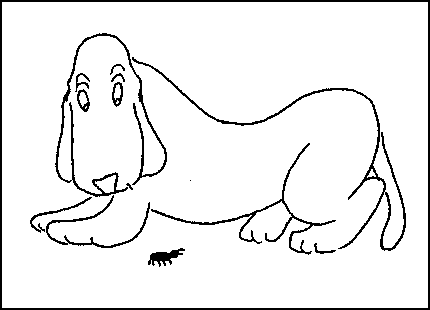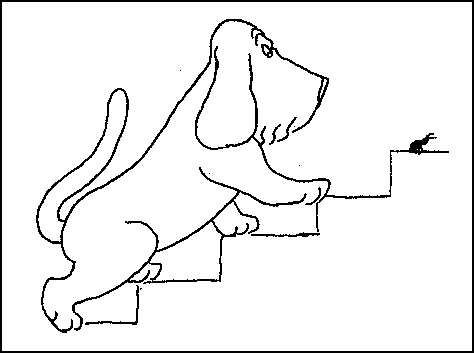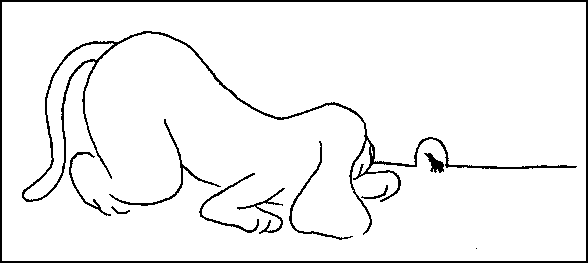Department
James Thurber
Michael J. Rosen, Editor
(Harper/Collins)

Thurber was a mainstay at the old New Yorker until he died in 1961. He was also an amateur artist --- people and animals in his hands were two-dimensional and rough (he never could do hands or necks). Dozens of his brief pieces and twenty-five of his longer essays are included here, along with almost 200 of his drawings, including one in the lower right corner of the volume that you can flip to make dog and mouse --- it's either a mouse or a bug, who knows? --- move across the page, up the stairs, and back down again. Thurber art is an acquired taste.
I was prepared to like The Dog Department not at all. It's hard for some of us to be fond of books that anthropomorphise dogs, since over the years we have come to the conclusion that dogs are nothing more than highly sophisticated parasites who have figured out how to do a number on humans. They find that sentimental bone that most of us have and by stroking it, they make us care for them too much.
(In the interest of complete editorial disclosure, I will report that, even now, as we speak, I have two dogs lying about my room. I must also tell you that the two of them --- a street-dog named Doggie, a hairy Mexican chihuahua, Pantouflas --- drive me nuts. Both of them think I am the cat's pajamas, if I may use that phrase, and when I get back to my desk --- from the store, from the post office, from the bathroom --- their reaction is disgustingly sentimental, sloppy, noisy. You'd think that I had been long gone to Ouagadougou on extended sabbatical.)

Swimming was his favorite recreation. The first time he ever saw a body of water (Alum Creek), he trotted nervously along the steep bank for a while, fell to barking wildly, and finally plunged in from a height of eight feet or more. I shall always remember that shining, virgin dive. Then he swam upstream and back just for the pleasure of it, like a man. It was fun to see him battle upstream against a stiff current, struggling and growling every foot of the way. He had as much fun in the water as any person I have known. You didn't have to throw a stick in the water to get him to go in. Of course, he would bring back a stick to you if you did throw one in. He would even have brought back a piano if you had thrown one in.
Then there is Jeannie, their Scottish terrier who discovered that if she went over to the other side of the lake from their summer home and sat up in front of the tourists' camp there, she would get free treats:
She had muzzled in, and for some time had been spending her days shaking down the cottagers for hamburgers, fried potatoes, cake, and marshmallows. They wondered where the cute little dog came from in the morning and where she went at night....
She figured out that the long trip home after her orgies was a waste of time, an unnecessary loop in her new economy [for] when she got home there was no payoff except a plain wholesome meal once a day. That was all right for young dogs and very old dogs and spaniels, but not for a terrier who had struck it rich over the hills.
Then there was his aunt, who the two family dogs hated:
My brightest remembrance of the old house goes back to the confused and noisy second and last visit of Aunt Mary, who had cut her first visit short because she hated our two dogs --- Judge, an irritable old pug, and Sampson, a restless water spaniel --- and they hated her. She had snarled at them and they had growled at her all during her stay with us, and not even my mother remembers how she persuaded the old lady to come back for a weekend, but she did, and what is more, she cajoled Aunt Mary into feeding "those dreadful brutes" the evening she arrived.
Thurber's mother borrowed sixteen dogs from the neighborhood street, and hid them in the cellar, so at feeding time, she had Mary set the food down in front of the cellar door and open it up:
When the door opened and they could see the light of freedom and smell the odor of food, they gave tongue like a pack of hunting hounds. Aunt Mary got the door halfway open and the bodies of three of the largest dogs pushed it the rest of the way. There was a snarling, barking, yelping swirl of yellow and white, black and tan, gray and brindle as the dogs tumbled into the kitchen, skidded on the linoleum, sent the food flying from the plate, and backed Aunt Mary into a corner. "Great God Almighty!" she screamed. "It's a dog factory!"
